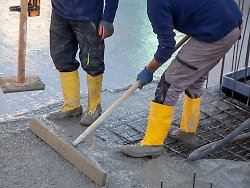Thursday December 30th 2021
SPD wants stricter controls
Many companies cheat on the minimum wage
In 2021, the financial control of illegal employment will initiate more than 3000 proceedings against German companies. The reason: violations of the statutory minimum wage or industry minimum wages. The construction industry is particularly affected. Like the SPD, IG BAU also calls for stricter controls.
Also this year, a number of companies did not comply with the statutory minimum wage or industry minimum wages – the financial control of illegal employment (FKS) of the customs administration initiated more than 3000 investigative proceedings by the end of November. This was announced by the Federal Ministry of Finance. The construction industry was particularly hard hit. In view of the planned increase in the minimum wage to twelve euros, calls for stricter controls came from the SPD and the IG BAU union.
The Federal Ministry of Finance issued figures from the FKS at the request of the SPD parliamentary group’s spokesman for building policy, Bernhard Daldrup. Accordingly, by the end of November this year, the financial control initiated 3,083 preliminary proceedings and imposed 12.5 million euros in fines. During the period, 816 cases of minimum wage fraud were uncovered on construction sites alone, and fines of EUR 3.88 million were imposed on the companies.
The statutory minimum wage rose to EUR 9.50 on January 1, 2021, and rose again to EUR 9.60 in July of this year. At the turn of the year it rises again – this time 9.82 euros per hour. The next increase to 10.45 euros will follow in July 2022. However, the Ampel-Coalition has already announced that it will raise the minimum wage to twelve euros in a single step.
“More effective controls are essential”
The risk of being caught with violations is “apparently too low for many employers”, explained Daldrup. “The Federal Labor Ministry and the Federal Ministry of Finance must not let up in the controls in the course of the increase in the minimum wage – on the contrary, they have to tighten the controls,” he told the newspapers of the Funke media group.
Against the background of a minimum wage of twelve euros, “more effective controls are indispensable,” continued the SPD politician. This also included more staff at the FKS and a “clearer increase in fines”. Good wages are also the best way to counteract the shortage of skilled workers.
The head of the IG BAU union, Robert Feiger, made a similar statement. “A significantly higher control pressure is necessary,” he explained. As soon as the legal minimum wage rises to twelve euros, there will be 7.2 million people who will benefit from it. “But that also means that there are 7.2 million additional wage packets that the state has to keep an eye on.”
If you stick to the control activity that has been practiced up to now, “then at best you can soon only speak of ‘placebo controls’ with a defined minimum risk for employers,” warned Feiger. The trade unionist sits on the parity minimum wage commission, which regularly reviews and adjusts wages.
Meanwhile, the German Trade Union Federation (DGB) called on the Ampel-Coalition to implement the increase plans quickly in the coming year. In the usual procedure of the minimum wage commission, the amount of twelve euros would not be reached until the end of the decade, warned DGB board member Stefan Körzell. “People who work for low wages cannot wait for that”. A poverty-proof minimum wage is overdue.
